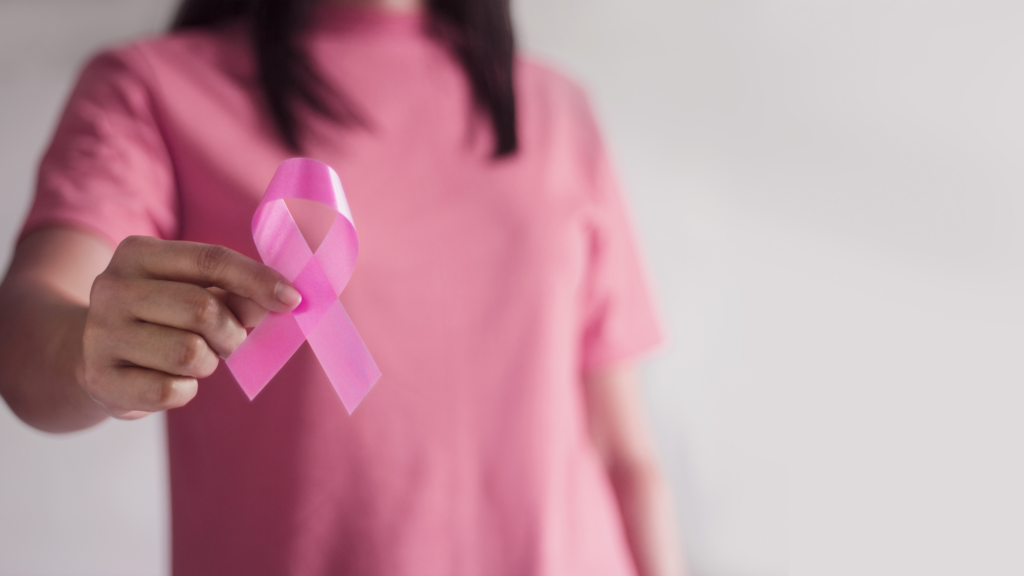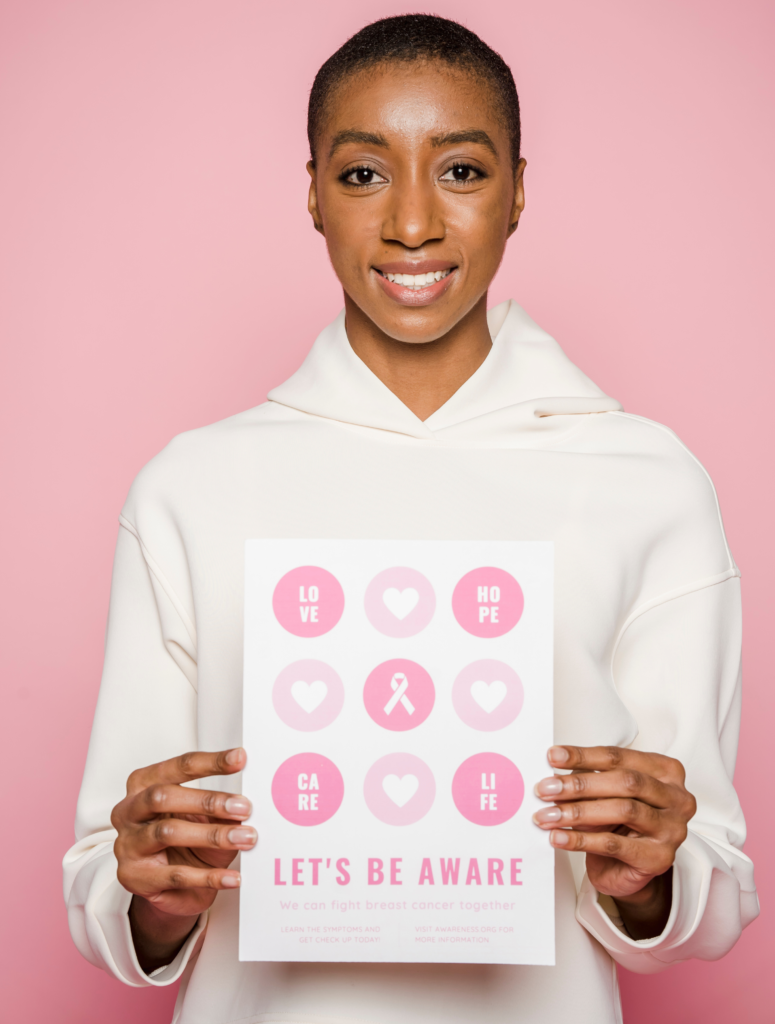By Tiffanie Brown, LCSW-R Renewed Focus Clinical Director

Breast cancer awareness is personal for me, and as a Black woman and therapist, I want to share my story and offer guidance to others facing similar fears and realities. This October, during Breast Cancer Awareness Month, I’m here to speak directly to you.
First and foremost: ladies, feel your boobs! Whether you think you’re too young or that cancer doesn’t run in your family, it’s critical to check. Stand in front of the mirror and massage your entire breast, including under your armpit. Trust me, there’s no breast too small to examine. Don’t think you’re invincible because no one in your family has had it—genetics don’t tell the whole story. You can be the first.
Black Women and Breast Cancer: The Stats
Black women face a unique set of challenges when it comes to breast cancer. Statistically, we are more likely to be diagnosed with aggressive forms of the disease at later stages. And while white women may have a slightly higher chance of developing breast cancer, Black women are 40% more likely to die from it. This is partly because of delayed diagnoses, lack of access to quality healthcare, and cultural barriers that discourage regular screenings.
Now, here’s how I became an advocate for breast cancer awareness.
My Diagnosis: The Day My World Shifted
In June 2023, while lying in bed, I felt a sharp pain in my right breast, just above my nipple. I didn’t think much of it at first—it felt like a tiny lump, the size of a green pea. My initial instinct was to ignore it and assume it was related to my menstrual cycle. There was a small tinge of anxiety in the pit of my stomach, but I brushed it off.
This is what denial looks like. I was used to handling things myself, controlling every aspect of my life—this came from years of feeling powerless during my childhood. But that day, something shifted. I told my partner about the lump, and their concern made me realize I couldn’t ignore it.
Two days later, I was sitting in my gynecologist’s office, and 48 hours after that, I was undergoing a mammogram and biopsy. Within five agonizing days, I found myself staring at my patient portal, trying to decode the results. I remember focusing on the word “malignant.” It was like my brain short-circuited. I needed malignant to mean not cancer. I even searched for “malignant not cancer” in Google, hoping for a miracle.
But the reality was clear: I had breast cancer.

Navigating the Diagnosis
In those first few weeks, I felt like I was trapped in a nightmare. It was as if I was the main character in a movie where the villain is chasing me, and no matter how hard I tried, I couldn’t escape. I was paralyzed by fear, overwhelmed by the looming uncertainty of what would happen next.
Depression hit hard. I cried, I screamed, and I let thoughts of death consume me for weeks. I wanted so desperately to live that the fear of death became all-encompassing. I didn’t know who to blame. I was angry—angry at my body, angry at my diagnosis, and angry at the information overload that accompanied it. I scrutinized every word my doctors said, researched every statistic, and triple-checked every piece of advice.
Every breast cancer journey is unique, and mine involved genetic testing, scans, a mastectomy, egg preservation, chemotherapy, and hormone therapy that will last for 10 years. As a Black woman, I had to fight for my voice in the treatment room, challenging my providers and making sure I was a partner in my care. I wanted to have control over my body in a time when everything felt beyond my control.
Finding My Power Through Faith and Support
Y’all! Chemotherapy is no joke. It strips you down to the core. My hair fell out, my skin dried up, my appetite changed, and my weight fluctuated. But even as my body changed in ways that felt like a betrayal, my spirit grew stronger.
Faith was the foundation I leaned on. My relationship with God deepened as I cried out for answers, comfort, and guidance. I bargained with God—pleading for the cancer to go away, promising I would change my life. And in some ways, that’s exactly what I did. I refused to let cancer define me.
I also learned how important it is to lean on the people who love you. My family and friends wrapped me in their love and support, giving me the strength to push forward. They never left me alone. If you are going through this journey, know that you don’t have to do it alone. You shouldn’t if you don’t have to. Allow the people who care about you to encourage and support you.
Coping with Anxiety During Breast Cancer Awareness Month
October can be a tough month for many of us who have been diagnosed with or fear breast cancer. The pink ribbons, mammogram reminders, and cancer statistics can easily trigger anxiety or anger. Often, people don’t know what to say and may share a story about someone they know who survived or passed away from breast cancer. While this can feel overwhelming, they’re usually trying to connect or offer comfort through a shared experience, even if it doesn’t come across the right way. It’s okay to feel triggered, anxious, or even angry. Here are some strategies I often tell my clients to help navigate this time:

1. Ground Yourself in the Present: I often tell my clients that grounding techniques can be incredibly helpful during anxious moments. Example: When you start feeling your heart rate increase, focus on your breathing; if your mind is racing, focus on 5 things you can see in your environment.
2. Limit Your Exposure: I encourage my clients to be mindful of their media consumption. You don’t need to watch or read every piece of breast cancer awareness content. If it feels like too much, it’s perfectly okay to step away from the news or social media. Protecting your mental and emotional space is key to maintaining balance. Play your favorite playlist instead!
3. Talk to a Therapist: I always remind my clients that they don’t have to face triggering feelings alone. Speaking to a therapist can offer relief, especially if breast cancer awareness month brings up difficult emotions. Working with a therapist like myself can help you process these feelings in a safe and supportive space.
4. Focus on What You Can Control: Many of my clients feel overwhelmed because they focus on things they can’t control. Instead, I suggest they shift their attention to what they can control—like scheduling regular check-ups, cooking your favorite meals, and making time for self-care. Taking small, actionable steps can ease feelings of helplessness.
5. Practice Mindfulness: I often introduce mindfulness exercises to clients, like meditation or yoga, to help them stay grounded in the present. These practices are proven to reduce anxiety and can be a great way to manage emotions during stressful times. Even a few minutes a day can make a big difference.
How to Perform a Breast Self-Exam
I want to empower you to take control of your health. Here’s how to perform a thorough breast self-exam:
1. Stand in front of a mirror with your shoulders straight and your arms on your hips. Look for any changes in the shape, size, or color of your breasts, such as dimpling, puckering, or changes in your nipples.
2. Raise your arms and look for the same changes. Do your breasts move symmetrically? Any abnormalities?
3. Feel your breasts while lying down. Use your right hand to feel your left breast and your left hand to feel your right breast. Using the pads of your fingers, move in a circular motion from the outer part of the breast to the center, including your armpit area. Don’t forget the tissue up toward your collarbone.
4. Feel your breasts while standing or sitting. Many women find it easiest to do this in the shower. Cover the entire breast using the same hand motions, making sure you check under the armpit.
If you notice anything unusual, don’t panic. Not all lumps are cancerous, but it’s essential to get checked by a healthcare provider.
Final Thoughts
Breast cancer changed my life, but it didn’t take it from me. I’m here, fighting, advocating, and loving harder than ever. And I’m encouraging you to do the same—whether you’re a survivor, a thriver, or simply someone who cares. Check your breasts regularly, schedule your mammograms, and trust your body when something feels off.
If you take anything away from this, let it be this: You are your best advocate. Listen to your body, ask questions, challenge your healthcare providers when necessary, and remember that you have the power to take charge of your health.
Ready to prioritize your health and well-being?
Email us at hello@arenewedfocus.com to book a consultation today! Let’s take the next step together in empowering you on your journey.

